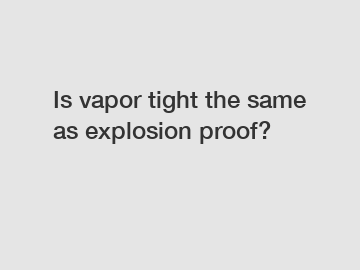Is Vapor Tight the Same as Explosion Proof?
When it comes to ensuring safety in hazardous environments, particularly in areas where flammable substances are present, it is crucial to understand the different classifications and standards for electrical equipment. Two terms that are often confused are "vapor tight" and "explosion proof." While they both serve to prevent accidents and protect against potential ignition sources, they have distinct characteristics and purposes. In this article, we will explore the differences between the two and shed light on their individual functions.
What does "Vapor Tight" mean?

Vapor tight refers to electrical fixtures, enclosures, or systems that are designed and constructed to prevent the ingress of liquids, dust, and vapors. These fixtures are sealed tightly to ensure that no external elements can penetrate or damage the internal electrical components. Vapor tight equipment is commonly used in environments where there is a high possibility of exposure to water, moisture, or corrosive substances. They are essential in areas like food processing facilities, chemical plants, or marine operations, where protection against external agents is necessary to maintain operational efficiency.
Understanding "Explosion Proof":
On the other hand, explosion-proof equipment is specifically designed to minimize the risk of explosions in hazardous environments by containing and preventing the ignition of flammable gases, dust, or vapors. These devices are constructed to withstand and contain any internal explosion, ensuring that it does not ignite the surrounding hazardous atmosphere. Explosion-proof equipment is often used in oil refineries, chemical plants, mines, or any area where combustible materials are present. They undergo rigorous testing to meet specific safety standards and are marked and certified as explosion-proof.
Key Differences:
1. Design and Construction:
Vapor tight fixtures are primarily focused on preventing the ingress of liquids, dust, and vapors. They have watertight gaskets, sealed openings, and corrosion-resistant materials to ensure a tight seal and maintain the efficiency of electrical components. On the other hand, explosion-proof equipment has a robust construction that can withstand internal explosions. It is designed to contain any potential ignition source, preventing it from igniting the surrounding explosive atmosphere.
2. Certification:
Vapor tight equipment may not require any specific certification; however, it needs to adhere to industry standards for ingress protection and corrosion resistance. On the contrary, explosion-proof devices must undergo rigorous testing by authorized third-party organizations to be certified as explosion-proof. They receive a mark or rating indicating their suitability for specific hazardous areas.
Conclusion:
In conclusion, while vapor tight and explosion-proof equipment share the common goal of ensuring safety in hazardous areas, they serve different purposes. Vapor tight devices protect electrical components from the ingress of liquids, dust, and vapors, while explosion-proof equipment is designed to contain internal explosions, preventing them from causing a catastrophic event. Understanding the specific requirements of your industry and the nature of the hazardous environment is crucial in selecting the appropriate equipment to guarantee safety.
If you have any further questions regarding vapor tight or explosion-proof equipment, please feel free to contact us. Our team of experts will be happy to assist you in finding the best solutions for your specific needs.
Want more information on explosion proof panel board, explosion proof panel, panel explosion proof? Feel free to contact us.



Comments
Please Join Us to post.
0